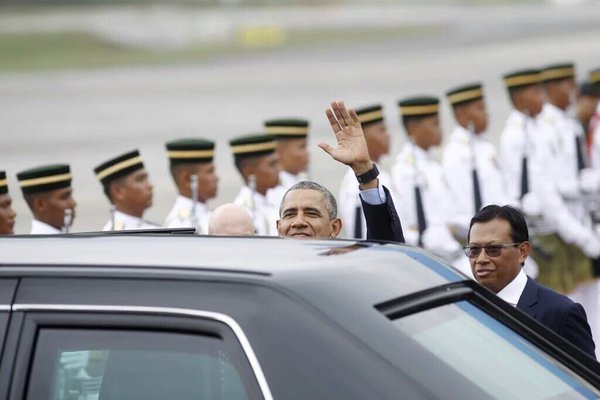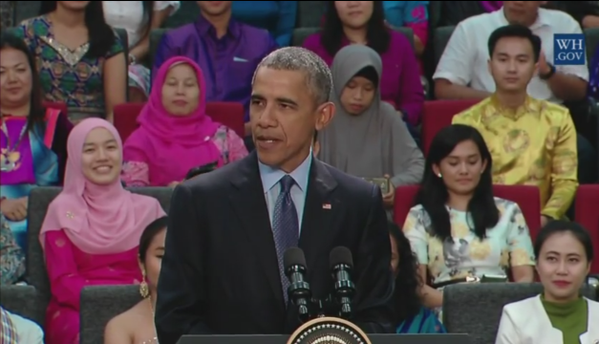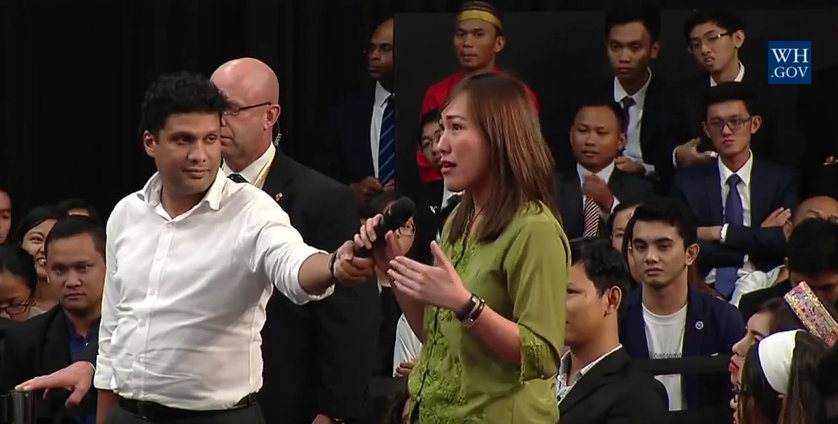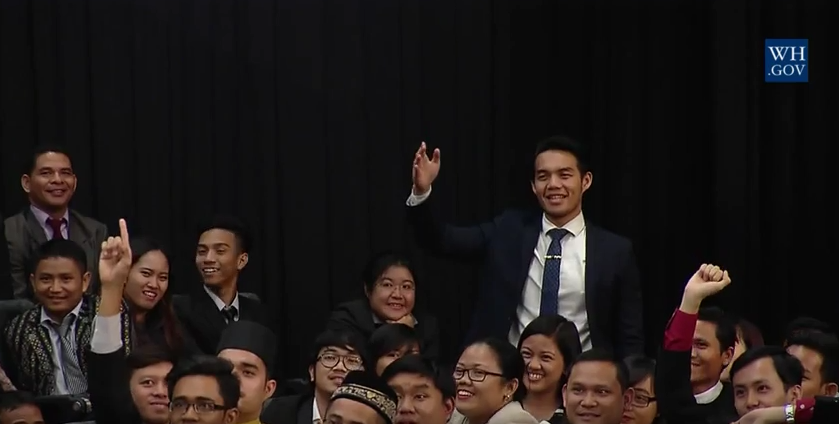4 Really Important Questions Obama Was Asked At Taylor's And How He Responded
US President Barack Obama met with 500 members of the Young Southeast Asian Leaders Initiative at Taylor's University where he answered a multitude of hard-hitting questions fielded by some of Southeast Asia's emerging leaders.
After landing in KL yesterday, 20 November, the POTUS went straight to a town hall session at the Young Southeast Asian Leaders Initiative (YSEALI) Summit held at Taylor's University, which was attended by 500 emerging leaders from 10 ASEAN countries
At the Town Hall, Obama answered a multitude of questions, from politics to economy and renewable energy, fielded by the Southeast Asia's emerging leaders. Below we are listing down 4 of the most important questions asked to him and how he responded to them:
Important question #1:
Elizabeth from Indonesia, who wanted to know what is President Obama's expectation from entrepreneurs for climate change, asked:
"Because some of us here are entrepreneurs. We are not yet political leaders, but we are entrepreneurs. So my question is basically, for the upcoming U.N. climate change in Paris, whether you are optimistic, the response of that?"
How President Obama responded:
He began by emphasising the fact that many of the young people present at the Town Hall understand why climate change is so important, and highlighted how if we don't stop the amount of carbon that we send up, and if we don't find new ways of creating energy, then how climate change could have a devastating effect on countries all around the world, especially on the poorer countries who lack infrastructure to protect themselves.
The President said that the climate change is not just an environmental issue, but it's also a development issue and once it starts, it's hard to reverse, adding that business has an important role to play here.
Citing an example of a young woman who recently invented a lamp that could generate eight hours of light with sea water, he spoke about how business is going to be critical in dealing with climate change.
"Because sometimes — especially in poor countries — people think, well, we don't have to worry about the environment because first we have to develop and create businesses and become wealthier, and then we can worry later about the environment. But part of what I'm trying to persuade business is that you have a start now, and there are business opportunities — you can make money in clean energy, instead of using dirty energy," Obama said.
Giving an example of how fast China has developed but the fact that they can't breathe in Beijing due to the pollution there is making the country realise how they have got to start using different production models which new businesses can help to design new ways of manufacturing, new ways of developing energy, President Obama criticised the old-fashioned industries , "the old ways of doing business".
"*I know that people here, for example, have been dealing with smoke from the peat fires that are coming over from Indonesia. **Well, the palm oil industry, that's not a high-value industry. I mean, that's not something that's going to develop a strong middle class and business opportunities over the long term. It's just a classic extractive industry or commodity industry. And in the modern economy, you want to be inventing new products and services rather than just figuring out what you can take out of the ground. And so **I'm encouraging both governments and businesses to start thinking about the opportunities of clean energy."
Finally coming to the topic of the upcoming U.N. climate change meet in Paris, he said:
"Our hope is to get all the countries to agree that they will set targets for reducing carbon emissions. It won't be the same for every country. More developed countries, they should do more. Less developed, they don't have to do as much because they haven't contributed so much to carbon pollution. But everybody has to do something. And what we want to do is have each country try to create incentives for businesses, whether it's tax breaks or investments in research so that businesses can work alongside communities to try to solve the problem."
Important question #2:
Alphaeus Tan from Malaysia, whose question, which was more of a request, to President Obama has already gone viral on social media, with netizens praising him for his bravery for bringing up an issue that is close to the hearts of many Malaysians.
Here's what Alphaeus asked:
"Talking about democracy and freedom of speech, Malaysia is currently embroiled in a political scandal and its frail justice system can bring no rights. Therefore, as thankful as I am for this, I would like to take this opportunity to ask you for your assistance in raising this issue to the Prime Minister of Malaysia and encourage transparency and independence of operations of the Malaysian Anti-Corruption Commission, Public Accounts Committee, Bank Negara, and all media organisations."
How President Obama responded to his request:
After a little pause, Obama replied: "I will do it," adding that, "Now, I admit that I was gonna do it anyway, but now that I hear it from you, I'm definitely going to do it."
However, he then went on to explain about the position and role of the United States and how sometimes people do not want them to meddle in their internal affairs. He highlighted that how at times his own country has its problems and he did not want to tell others what to do.
"There have been times where we have problems in our own country. And so we will want to go tell other people what to do, but then back home we're not always doing what we say we should do," he said, adding that there are basic values that we all share.
"One of those values is that countries work best when everybody has a voice that can be respected, and that the press is able to report on what is happening in current affairs, and people can organise politically peacefully to try to bring about change, and that there's transparency and accountability. And when you look at which countries have done best in terms of development, typically over time, those countries that have some accountability and some measure of personal freedom tend to do better. And those countries that don't, have more problems."
He also said that while there are occasions everywhere in the world where the United States has a relationship and cooperates with a country, even though their human rights record may not be good, the United Stated always raises these issues.
Important question #3:
Uma from Indonesia, who is working in Center for Handicraft and Batik in Yogyakarta, where her office encourages people to use the natural dyes to colour in the batik and handicraft, wanted to know why some of the developed countries are still exporting unfriendly, sensitive dyes to developing countries like Indonesia and Malaysia.
"So my question is simple: What do you think about this situation?"
Here's how the US President responded to that:
Obama began by confessing that he doesn't know enough about batik production to know what sort of the differences are in the prices of dyes and what works and what doesn’t. He then said that in the United States consumers are more and more interested in environmentally friendly and organic products.
However, while commenting on the issue of countries selling artificial dyes into Indonesia and other places, the US President took a defensive approach, saying that "that's the way the businesses work".
"Now, as long as they're not poisonous and they're not hurting people, that's not something probably that you're going to stop. But what you can do is to start marketing the fact that you use natural dyes, and that may be very appealing to people."
"Which," he said, "brings up a larger question, which is the issue of trade".
"We just completed this Trans-Pacific Partnership, which brings together 12 countries in the Asia-Pacific region, including a number of ASEAN countries like Malaysia and Vietnam. And trade is something that can be good and can be bad. It is good in the sense that it allows each country to pursue the things that it's best at, produce goods that they can do better than others, and everybody can get richer. It also can create real problems because it brings about competition, it can change the way things are done in each country. And if somebody from another country has a much more efficient, effective way of making a product, then the local producers can lose a lot of businesses and people can be displaced from their jobs," he said.
Speaking about how the goal of every country is not close off from trade, but if competition comes in, then the government has to help that country adjust to this new competition and to find new ways of creating jobs and creating wealth, Obama praised Singapore as a country, which despite being a tiny little country that doesn't have any oil or any other significant natural resources, has done very well by investing in its people, in providing them education, with its government running itself very efficiently.
"And the truth is that in today's economy, countries are constantly having to change. They constantly have to transform themselves. And people constantly have to change. Because the economy is just too dynamic and moves too fast because of the Internet, because of transportation. You can't cut yourself off — unless you're North Korea — you can't cut yourself off from the world.
And those countries that try typically fall behind, because they can't keep up with the ever-changing economic environment. So this is where good government policy is important, and helping people retrain and helping industries adapt, that's one of the most important roles of government in today's economy."
Important question #4:
Rizal from Malaysia probably had the most hard-hitting question to ask. His question was regarding the TPPA Agreement, which he and the Civil Society Organisations in Malaysia believe that the TPPA is a very elitist deal. Rizal while saying that "the people have been excluded from it, even from the start," asked:
"How does this bill you say that which includes everything, how does it tally with your principles of human rights, transparency, and equality that the U.S. stands for?"
How Obama responded to it:
The US President went on a lengthy explanation.
He said that "what is true is that whenever you're negotiating a trade deal — and this is true for any trade agreement — if you're negotiating with 12 countries and if there's not some space for the negotiators to basically agree on the deal, but the whole time everybody is commenting on every aspect of it, then it would never get done."
Citing the example of United States and why people there have been excluded, Obama said:
"If basically every chapter was subject to various interest groups asking, well, we want more of this, or we want more of that, and the business community saying, we want this, and the labour union saying, we want that — just in the United States, we could never get it done. And then when you try to get 12 countries together, and everybody was in on every aspect of the negotiation, it would never be finished because people would always ask for more."
Basically, his justification for keeping people's interest groups out of the TPPA negotiations is that people would always ask for more. "The pharmaceutical companies would want more. The agriculture sector would want more. Everybody would want something."
He, however, said that the TPPA deal is subject to review. It's up on a website where people can go and read every chapter, and each country then has to ratify it and it's subject to the approval of the legislatures or the parliaments in approving or disapproving it.
"*So the point is that it's inaccurate to think that transparency means that you and everybody else are all in a room together negotiating the entire time in an open environment because it would never get completed — partly because each country has to give up something in order to get a trade deal done."
Directly addressing Rizal's claim, Obama said some of the specific things he said are actually inaccurate as what the US did in this deal was they said that they should provide some intellectual property protection. Otherwise nobody is going to invent anything new. Because the minute they did, then there would be a generic that was produced right away, and there would be no point in inventing it because you wouldn’t make any money.
"We have to make sure that the change is good for ordinary people, that it's good for the farmer, good for the young student; it's good for women, it's good for developing countries. But I do not believe that we can stop change. I do not believe that, for example, if we just put up a bunch of barriers to trade, that that's going to help countries grow. I don't think that if we try to stop technology that somehow we're going to be better off. I think we have to embrace change, but then we have to figure out how do we make sure that everybody benefits from change and not just a few."





